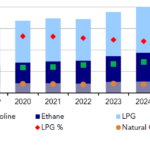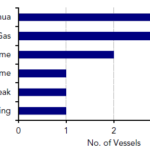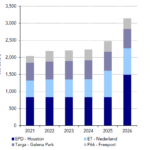LNG in World Markets: Cedar LNG Takes Three Major Steps Forward in De Facto FID
Canadian pipeline operator Pembina and the indigenous Haisla Nation are raising as much as $2.4 billion for the $4 billion project, and targeting a mid-2024 final investment decision (FID) for the proposed 3-MMt/y Cedar LNG export terminal in British Columbia. They have signed a pair of commercial agreements, issued a notice to proceed (NTP) to the project’s shipbuilder and are seeking loans from banks.
The commercial agreements, NTP and debt offerings are viewed as a de facto FID. The proposed project is a 50-50 joint venture between Pembina and the Haisla Nation that plans to use an FLNG vessel docked along the shore for all its production. If successful, Cedar could potentially become the first global LNG export project to reach FID this year. However, Middle East player ADNOC is also in contention and is said to be preparing to reach FID on its 9.6-MMt/y Ruwais LNG export project during the 1H 2024.
Cedar and six other North American LNG export projects with combined capacity of 51.8 MMt/y were expected to reach FID this year (see LNGWM, Dec ’23) but an export permit pause enacted in late January by the Biden administration put most of them on hold until after the November 2024 US presidential elections. A political compromise between the Democrat president and the Republican-led US House of Representatives could lift the pause but it is unclear how long it would take regulators to resume permitting activities. Because Cedar will use Canadian-sourced natural gas, it does not require any US permits and has now found itself as the frontrunner among North American LNG export projects.
To read the full analysis, please click here.
LNG in World Markets: Cedar LNG Takes Three Major Steps Forward in De Facto FID
Canadian pipeline operator Pembina and the indigenous Haisla Nation are raising as much as $2.4 billion for the $4 billion project, and targeting a mid-2024 final investment decision (FID) for the proposed 3-MMt/y Cedar LNG export terminal in British Columbia. They have signed a pair of commercial agreements, issued a notice to proceed (NTP) to the project’s shipbuilder and are seeking loans from banks.
The commercial agreements, NTP and debt offerings are viewed as a de facto FID. The proposed project is a 50-50 joint venture between Pembina and the Haisla Nation that plans to use an FLNG vessel docked along the shore for all its production. If successful, Cedar could potentially become the first global LNG export project to reach FID this year. However, Middle East player ADNOC is also in contention and is said to be preparing to reach FID on its 9.6-MMt/y Ruwais LNG export project during the 1H 2024.
Cedar and six other North American LNG export projects with combined capacity of 51.8 MMt/y were expected to reach FID this year (see LNGWM, Dec ’23) but an export permit pause enacted in late January by the Biden administration put most of them on hold until after the November 2024 US presidential elections. A political compromise between the Democrat president and the Republican-led US House of Representatives could lift the pause but it is unclear how long it would take regulators to resume permitting activities. Because Cedar will use Canadian-sourced natural gas, it does not require any US permits and has now found itself as the frontrunner among North American LNG export projects.
To read the full analysis, please click here.





